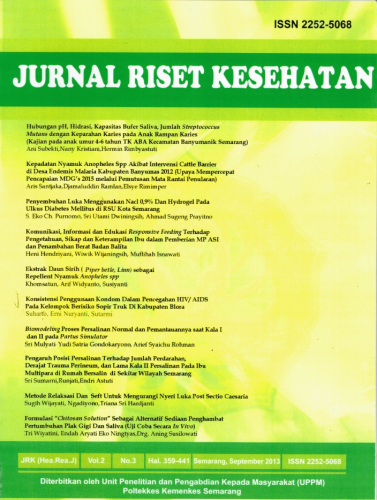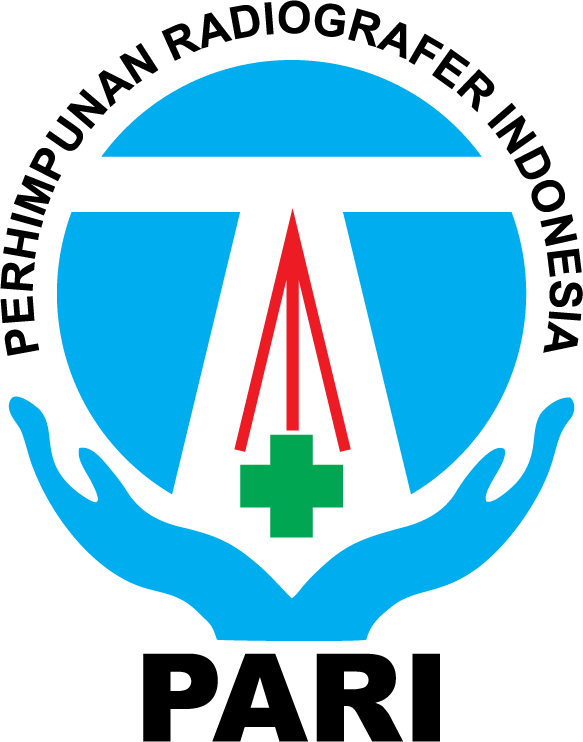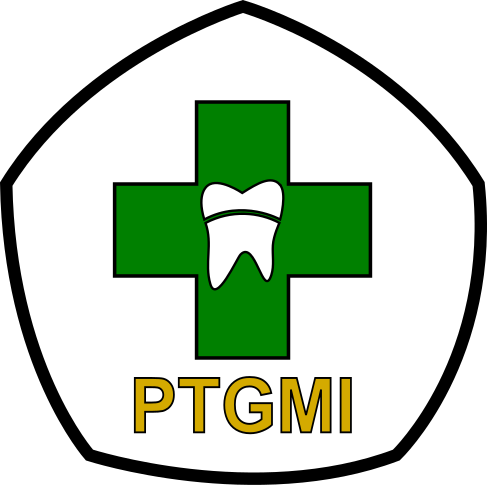TECHNICAL SKILLS OVERWHELMING SOCIAL SKILLS OF OCCUPATIONAL HEALTH NURSING ON TEACHING METHODS
Abstract
The teaching of occupational health nursing (OHN) requires an emphasis on which one should be dominant between technical and social domain, as practiced in the industrial health care services. The purpose of this research is determine which skill domain is more dominant between technical and social skills in the OHN teaching-learning system. This type of study is quantitative approach with cross-sectional study design. The populations were nursing students, nursing practitioners, and nursing lecturers. The sampling technique is non-probability sampling taken online with a sample size of 130 respondents of Indonesian nurses in Indonesia. The data collection tool used a mixed questionnaire in a Likert Scale based on the Health Belief Model theory. The data were analyzed using the Paired Sample T-Test to see whether the results of this study were dominated by the technical or social skills domain. The validity and reliability test was carried out with a sample of 30 people. They were measured by looking at the r table and the Cronbach alpha value for each questionnaire statement, using the SPSS application with the Pearson Product Moment test. The T-Test result of SPSS shows 95 respondents (73.1%), perceived technical skills dominate the OHN work in industry, and 35 respondents (26.9%) in social skills, with a p-value of 0.000. In other words, the dominance of technical skills has a very close association to the teaching-learning system. The need for technical skills is much more dominant than social skills. OHN teaching needs to have an emphasis on technical skills, not the social domain.
Keywords
Full Text:
PDFReferences
AAOHN. (2004). Standards of occupational and environmental health nursing. Journal Occupational Health Nursing, 52(7), 270–274. https://doi.org/10.1177/216507991206000301
Abdul Rahman, H., Jarrar, M., & Don, M. S. obr. (2015). Nurse Level of Education, Quality of Care and Patient Safety in the Medical and Surgical Wards in Malaysian Private Hospitals: A Cross-sectional Study. Global Journal of Health Science, 7(6), 331–337. https://doi.org/10.5539/gjhs.v7n6p331
Abraham, C., & Sheeran, P. (2014). The health belief model. Cambridge Handbook of Psychology, Health and Medicine, Second Edition, January, 97–102. https://doi.org/10.1017/CBO9780511543579.022
Aliakbari, F., Parvin, N., Heidari, M., & Haghani, F. (2015). Learning theories application in nursing education. Journal of Education and Health Promotion, 4(1), 2–2. https://doi.org/10.4103/2277-9531.151867
Allobaney, N. F., Nashwan, A. J., & Mohamed, A. S. (2020). Nursing Research during COVID-19 Pandemic : A Scoping Review. Nursing, October. https://doi.org/10.4236/ojn.2020.1010066
Asociation of Registered Nurses of Newfoundland and Labrador. (2006). Scope of nursing practice: definition, decision-making and delegation. Association of Registered Nurses of Newfoundland and Labrador, 26. www.arnnl.ca,
Gillespie, B. M., Harbeck, E., Kang, E., Steel, C., Fairweather, N., & Chaboyer, W. (2017). Correlates of non-technical skills in surgery: A prospective study. BMJ Open, 7(1), 1–9. https://doi.org/10.1136/bmjopen-2016-014480
Hardy, S. (2012). New Paradigm of management of Occupational Health Nursing Dalam Pembelajaran Community of Nursing. Jurnal Keperawatan, 3(2), 138435.
Hardy, S., Sanudin, A. H., & Afzal, R. (2021). Analysis of Imbalance Between Government Regulations and Nursing Education on Industrial Nurses. 3(1), 17–26.
Huston, C. (2016). The impact of emerging technology on nursing care : Warp speed ahead. June 2013. https://doi.org/10.3912/OJIN.Vol18No02Man01
Jahja, R., van Spronsen, F. J., de Sonneville, L. M. J., van der Meere, J. J., Bosch, A. M., Hollak, C. E. M., Rubio-Gozalbo, M. E., Brouwers, M. C. G. J., Hofstede, F. C., de Vries, M. C., Janssen, M. C. H., van der Ploeg, A. T., Langendonk, J. G., & Huijbregts, S. C. J. (2016). Social-cognitive functioning and social skills in patients with early treated phenylketonuria: a PKU-COBESO study. Journal of Inherited Metabolic Disease, 39(3), 355–362. https://doi.org/10.1007/s10545-016-9918-0
Jokari, M., Jorfi Management, H., & Ebadi Candidate, G. (2012). Interdisciplinary Journal Of Contemporary Research In Business Study the Effect of Creativity and Innovation on Nurses’ Productivity in Taleghani Hospital (Case Study in Abadan of Iran). November.
Katajavuori, N., Lindblom-Ylänne, S., & Hirvonen, J. (2006). The significance of practical training in linking theoretical studies with practice. Higher Education, 51(3), 439–464. https://doi.org/10.1007/s10734-004-6391-8
Kirwa. Lilian Gakere, Z. (2016). Clinical skills competence of nursing students. In NurseLine Journal.
Lalloo, D., Demou, E., Kiran, S., Gaffney, M., Stevenson, M., & Macdonald, E. B. (2016). Core competencies for UK occupational health nurses: A Delphi study. Occupational Medicine, 66(8), 649–655. https://doi.org/10.1093/occmed/kqw089
Martínez-Buelvas, L., Jaramillo-Naranjo, O., & De La Hoz-Dominguez, E. (2021). Factors that affect quality of work life of the millennials linked to the commercial sector in Colombia. Economics and Sociology, 14(2), 71–84. https://doi.org/10.14254/2071-789X.2021/14-2/4
Ofei, A. M. A., Paarima, Y., & Barnes, T. (2020). Exploring the management competencies of nurse managers in the Greater Accra Region, Ghana. International Journal of Africa Nursing Sciences, 13, 100248. https://doi.org/10.1016/j.ijans.2020.100248
Özer, Ö., Şantaş, F., Şantaş, G., & Şahin, D. S. (2017). Impact of nurses’ perceptions of work environment and communication satisfaction on their intention to quit. International Journal of Nursing Practice, 23(6), 1–8. https://doi.org/10.1111/ijn.12596
Putri, S., Santoso, S., & Rahayu, E. P. (2018). Implementation of Occupational Health and Safety on Hospital Nurse Work Accidents. Jurnal Endurance, 3(2), 271. https://doi.org/10.22216/jen.v3i2.2686
Rasmor, M., & Brown, C. (2001). Health assessment for the occupational and environmental health nurse: Skills update. AAOHN Journal, 49(7), 347–354. https://doi.org/10.1177/216507990104900708
Ruotsi, J., Rutanen, O., Bachelor, O., & Programme, S. D. (2019). Perceptions of nurses about the use of technology in nursing Literature review. April.
Seo, Y. H., & Cho, K. A. (2021). Effect of Korean advanced life support education on non-technical and technical skills of nursing students: A pilot study. Healthcare (Switzerland), 9(10). https://doi.org/10.3390/healthcare9101253
Showkat, N., & Parveen, H. (2017). Non-Probability and Probability Sampling. July.
Suwaileh, M., & Gwele, N. S. (2005). A curriculum for interprofessional learning. In Curriculum Development in Nursing. https://doi.org/10.4324/9780203313343
The International Council of Nurses. (2018). Transformation and Innovation. In 2016-2017 Biennal Report. https://www.icn.ch/sites/default/files/inline-files/ICN_Biennial report 2016-2017_FINAL.pdf
Tukayo, I. J. (2020). Nursing Education Management Character Based (S. Hardy (ed.); First Edit). Dialektika.
Tukayo, I., Jurun, H., Hardy, S., Saljan, M., & Swastika, I. K. (2021). The Challenges in Poltekkes Kemenkes Jayapura ( A Case Study ). 71–77. https://doi.org/10.26699/jnk.v8i1.ART.p
WHO. (2015). A guide to nursing and midwifery education standards. https://apps.who.int/iris/handle/10665/195726
Ye, C. (2021). How Does Education Affect the Time Spending on Work and Leisure? Proceedings of the 6th International Conference on Financial Innovation and Economic Development (ICFIED 2021), 166(Icfied), 274–280. https://doi.org/10.2991/aebmr.k.210319.050
Yılmaz, D. K. (2015). Innovation in Nursing Practices Global Journal on Advances in Pure & Applied Sciences Innovation in Nursing Practices. May. https://doi.org/10.18844/gjpaas.v0i7.3176.
DOI: https://doi.org/10.31983/jrk.v10i2.7542
Article Metrics
Refbacks
- There are currently no refbacks.
Copyright (c) 2021 Jurnal Riset Kesehatan




















































